2012 isn’t 1992
Some think that 2012 will be like 1992. However, that analogy is problematic.
With Mitch Daniels deciding to refrain from the 2012 fray, there will be renewed discussion of a political savior (so to speak) for the GOP. This hope takes the form of the notion that either one of the current candidates who looks like a loser will end up being said savior, or that some as yet unidentified candidate will emerge.
Especially when it comes to the former scenario (but even, to some degree, the latter), many have cited 1992 as a example. The story goes like this: going into the 1992 campaign cycle it appeared that George H. W. Bush was destined for re-election. Indeed, after the Gulf War he was The Most Popular President EverTM (indeed, 41 held the record for highest popularity until 43 overtook him right after 9/11) . As a result, all of the major Democratic candidates declined to run for their party’s nomination. The zeitgeist of that moment was well captured by an SNL skit called “Campaign ’92: The Race To Avoid Being The Guy Who Loses To Bush” which was a debate-style presentation wherein all the major Democrats of the day (Mario Cuomo, Dick Gephardt, etc.) all were explaining why they they ought not be nominated.
So, as we know, since none of the big time Democrats ran in 1992 the race instead featured what might be called the second-string: Paul Tsongas, Bill Clinton, Jerry Brown and a few others. And, as we know, Bill Clinton went on to win the nomination and two terms in the White House.
Indeed, none of the 1992 candidates had run in 1988. That certainly underscores the attitude that a lot of major Democratic politicos had at the time.
To what degree is 2012 a similar scenario? That is, to what degree have all of the major Reps bailed on the chance to run, leaving the field to back-benchers to face a president who seems likely to be re-elected? The simple answer is: not much. If you look at the current GOP field we have a major candidate from the previous cycle (Romney*) and the flirtations, at least, of the party’s VP nominee (Palin**). Further, you have the last prominent Republican Speaker of the House (Gingrich) in the mix. For the 1992 analogy to hold, the field would have to have to utterly bereft of such figures.
Who are the Republican heavy-hitters who are sitting out this race? Rick Perry of Texas? Jeb Bush? Perry would be an interesting candidate, but he hardly has a national profile. Bush’s problems are obvious (indeed, are contain in this sentence and in every sentence that cites him by name). Daniels might fit the bill, but he isn’t analogous to Mario Cuomo, Dick Gephardt, Al Gore,etc. (all of whom declined to compete in 1992). I guess that maybe Chris Christie might fit the bill for some, but he isn’t a bigger Republican at the moment than is Romney or Palin.
If it appears that the current GOP field looks like the 1992 Democratic field (i.e., like a bunch of second stringers) that is a comment on the current quality of the GOP, not that 2012 is a Republican version of 1992. This is important to note because I think that it speaks to the overall weakness of the Republican field at the moment, and also underscores that the party is currently going through something of an identity crisis.
—-
*Granted, he has not declared yet, but is clear that he is running.
**And yes, the jury is out on whether she will actually run.
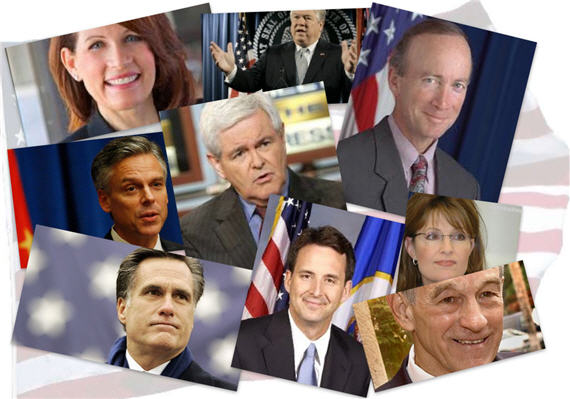

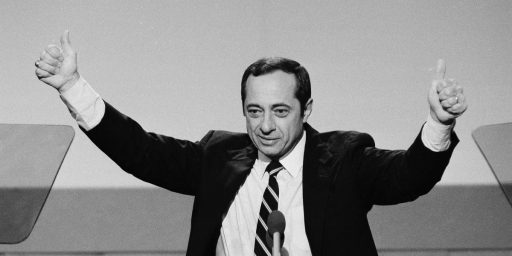
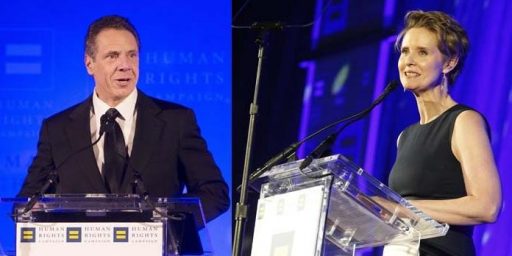
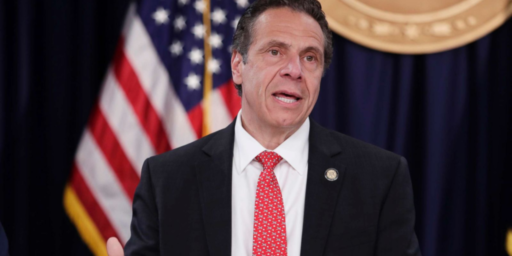
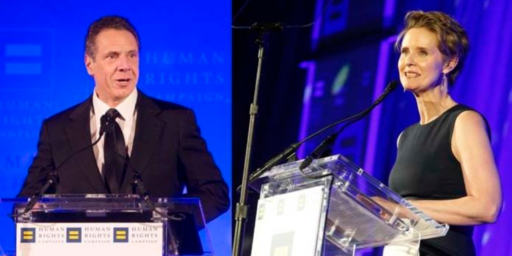
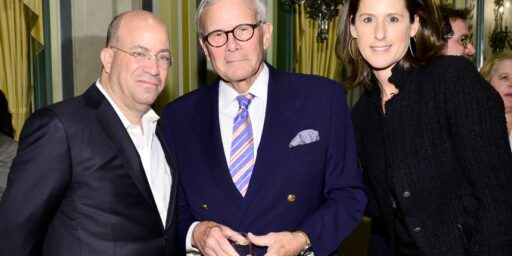
The other difference is that so-called republicans were only too willing to run G.H.W. out of office in thanks for the fiscal sanity he had shown. I have problems with some of Obamas moves…but I’m not about to vote against him…especially given the utter lack of depth in the republican field. Let’s face it…like him or not, Obama is the adult in this day-care center.
On the other hand, no one anticipated ’92 either. They were ‘The Seven Dwarfs’. I remember Rush commenting on the Dem convention as though it was a sad formality.
it’s utterly unscientific, but I go with the ‘Nobody knows nuthin’ approach to predictions. God knows I listen, but I’m crowded with all-too-many that were BS. Clinton after ’94. Obama and his ‘shellacking’, which remains to be seen. Pretty much anything a liberal says, tinged as it is with wishful-thinking (wishful politics, wishful thinking). And now that I’ve said all that, I think I might be sick.
A big difference that almost everyone seems to be ignoring, or at least overlooking, is that, thanks to the internet, the electorate is far better informed about the candidates and the issues. Furthermore, I am of the opinion that the voters are more interested than they have in the past. A recent poll found that 57% of voters were closely following political candidates and events.
And of course, the other big difference: The Tea Party.
I think you mean 1992, not 1988. Gore and Gephardt ran in 1988.
If we need an analogy, maybe 2004? I think Romney is somewhat comparable to Kerry (he’s theoretically got some economic gravitas which is important in 2012 as Kerry’s theoretical military gravitas was supposed to be important in 2004). But Edwards, Dean, and Clark seem like better options than Pawlenty, Gingrich, and Cain, so the analogy is far from perfect.
@TG:
You’re right: I meant 1992. Fixed.
I think the Tea Party’s 15 minutes have come and gone.
Here is a picture of Nikky Haley addressing South Carolina’s Tea Party last Thursday:
http://media.thestate.com/smedia/2011/05/19/20/teaparty_tg0131.standalone.prod_affiliate.74.jpg
I think TG Chicago called it. This is more 2004 than 1992.
Dave Weigel won Twitter today by pointing out that Harold Stassen’s chances are looking pretty good this time around.
More seriously, the chips really seem to be falling into place for Pawlenty, here. I think Romney needs more candidates to divide up the anti-Mitt vote. He might not win a two-person race, if it becomes that. And it might.
Just wanted to agree that this field is much “better” than the 1992 Dem field was perceived to be. May be closer to 1964 if Romney doesn’t get the nomination.
Ponce, nice try. Were you there? I’ll bet with little effort I could find a picture with the opposite implication.
People are bringing up ’92 largely as a cautionary tale, where candidates drop out in the belief that the sitting president is a shoe-in for reelection, ending up putting the presidency in the hands of a second-tier candidate.
But I do agree with the distinctions you raise. First of all, it’s not at all clear that the people who have dropped out so far did so out of fear of losing to Obama. There are other plausible explanations, and Obama’s approval rating hasn’t come anywhere near what Bush got in ’91 in the immediate aftermath of the Gulf War.
Also, it’s easy to draw too close an analogy because of the complaints of a “weak field.” If you go to Google News and look at articles from 1991, you’ll find plenty commenting on the “weak field”–but what the phrase meant was simply the relative obscurity of the candidates who were running, nothing more. Pundits weren’t saying that Clinton, Tsongas, Harkin, etc. were too stupid or insane or uncharismatic to win; they were simply saying they had little of a national profile at the time.
In contrast, when pundits talk about the “weak field” today, they are partly referring to the fact that the big names–Trump, Newt, Huck, Palin, Mitt–all have significant weaknesses, which is why the pundits have looked to potential dark horses (Daniels, Christie, Perry, etc.) for salvation. In that sense, it’s almost a reversal of the situation in ’91, in that being lesser known makes a candidate likely to be more valued by desperate Republicans today.
I think everyone is really missing the boat here. 2012 isn’t shaping up to be either 2004 or 1992 with a “reverse” incumbent pole (i.e. Democrat incumbent in 2012 or Republican incumbents in 1992 and 2004).
2012 is going to be the 1980 election all over again – a weak Democratic incumbent (who this time probably will not face a challenge in his own party – because that would be a “racist” act for anyone in his party to do), who has not solved the serious economic problems facing the country, and who has a foriegn policy record that most Americans find weak and distasteful, versus a Republcan candidate field that is less than inspiring a year before the general election, with these current candidates playing their 1980 counterpart roles:
Mitch Romney – playing the role of Ronald Reagan
Tim Pawlenty – playing the role of George HW Bush
Ron Paul/Michele Bachmann – both playing the role of John Anderson
Sarah Palin – playing the role of Bob Dole
Jon Huntsman – playing the role of John Connally
Newt Gingrich – playing the role of Howard Baker
Rick Santorum – playing the role of Phil Crane
all the rest (e.g. Herman Cain, Gary Johnson) – playing the role of Harold Stassen
I see Romney as the former Governor from a liberal state “front-runner” like Reagan was. I do not see Romeny as being as conservative as Reagan was, but Reagan was considered only a weak front-runner leading into the 1980 primary campaign (that is why every Republican office holder and their grandfather seemed to want to run that cycle – even if they were flawed as hell), and it wasn’t until his primary victories took place that he cemented his hold on the party for the 1980 campaign. I think Romney will likely do the same once the primary elections start to occur.
The only question I have – is will the Paul/Bachmann fringe go Third Party – which this time might lead to a Democrat victory in 2012, instead of the Republican victory in 1980, when the ABO vote (anybody but Obama) is split…
>who this time probably will not face a challenge in his own party – because that would be a “racist” act for anyone in his party to do
That has to be one of the dumbest remarks I’ve ever heard on this site.
The reason Obama will probably not face a significant primary challenge is (1) Despite the whining from the left about many of his policies, he still enjoys high approval ratings among Democrats as a whole, and liberals in particular. That could change in the next six months, but so far it hasn’t. (2) There is currently no Democrat with the prominence of a Ted Kennedy who would be likely to pose a formidable challenge to him in the primaries. Hillary Clinton might have served that role, if she hadn’t been appointed to his administration.
@Pete: “Ponce, nice try. Were you there? I’ll bet with little effort I could find a picture with the opposite implication.” Um. That photo is from an event that, according to organizers, drew all of 30 people. So in a sense, ponce is being disingenuous: there were 15 times as many people attending as shown in that photo.
“a weak Democratic incumbent”
Obama’s approval ratings are higher than Reagan in ’83 and Clinton in ’95. It’s hardly worth pointing out, then, that they’re well higher than Carter’s in ’79, but since that’s the comparison you’re trying to draw, well, they are. Obama isn’t storming into 2012 with a 60% approval rating (Well, okay, in that one poll, but still), but few two term Presidents have.
“has a foriegn policy record that most Americans find weak and distasteful”
Killed Bin Laden. What “most Americans find” =/= what you wish they thought.
“I see Romney as the former Governor from a liberal state”
California was not considered a “liberal state” in 1979. Nixon came from there, and it had a split Senate delegation. And of course, Reagan himself was already the icon of the conservative movement, and he’d been Governor for 8 recent years. Jerry Brown was only in his first term. And of course, Reagan carried California handily in the general election (as was expected).
“Reagan was considered only a weak front-runner leading into the 1980 primary campaign”
I don’t think that was the case. Reagan was the dominant figure from the wing of the party that had won the ideological war of the 1970s. Romney, of course, is on the wrong end of his party’s ideological divide, to say nothing of coming from a state he has no chance of carrying.
“that is why every Republican office holder and their grandfather seemed to want to run that cycle”
Except that really, only 8 serious candidates (and I’m being generous to Anderson and Crane) challenged Reagan. Though that IS a notably larger number than seems to be challenging Romney…which only seems to further complicate this analogy. At any rate, given Carter’s vast weaknesses, only 9 real candidates is actually a shockingly LOW number, and speaks to how strong a hold Reagan had on the party.
“and it wasn’t until his primary victories took place that he cemented his hold on the party for the 1980 campaign”
Again, this isn’t really how things went down. Reagan was considered pretty dominant at first, so much so that his staff developed an “above the fray” camapign for the early primaries. It was only after early LOSSES that he really started campaigning.
Of course, the “Obama = Carter!!!1!!!!” meme is as delightful as it is nonsensical, but the comparisons don’t really stretch to the re-election campaigns, at least as they’ve developed so far.
Also, I always object to the “1992 was weak” meme. Sure, Cuomo and Gore stayed out, and they were big names, but Clinton got in, and he was the head of a powerful new faction in the party, and had gotten plenty of attention (starting out negative, but he turned it around) in 1988. He’d been tapped as a rising star for a while. Cuomo and Gore frankly also had big weaknesses (and Gephardt really shouldn’t even be listed). So while this is a popular idea, I don’t think it’s very accurate; frankly the 2004 Dems and 2008 Republicans seem far weaker, overall.
Kylopod has it right above, I think.
I see no evidence that potential candidates are staying out because of a fear of Obama. It’s the Republican primary voters they fear. Rather, it’s the magnitude of the tack that will be required to get from the far right positions necessary to appeal to the Republican base back to something even close to the political middle required to win in the general election that aspirants to the GOP nomination realize will be nigh impossible.
I agree for the most part regarding this year’s field, but I think talk of an “identity crisis” is a bit overheated. Tough enough to predict 2012, never mind where the GOP will be in 2016, but it’s difficult to imagine that Rubio or Christie or Ryan or McDonnell would represent a fundamental shift in the American right.
HEY, I saw most of those pictured above, when I was living on the planet Tatooine. Just before I left, my buds and I were in a bar in Mos Eisly. That`s them in the picture. But there were a couple of others too not in the picture. There was a guy named Huckster, and he was trying to sell Bibles. And there was another fella, long orange hair. Everyone called him The Donald. He was a real loud-mouth, screaming about someone`s birth certificate and college transcripts. I thought he was drunk.
And the woman on the right, with glasses–she kept ranting about how much she hated a guy named Obama and kept ending her sentences with “you betcha”. And she kept talking about grizzly bears and death panels–it just reminded me of the Death Star and left me cold.
Really, that whole crowd was very rowdy, a motley crew. I wouldn`t pick any of them for leader of your world. Or mine.